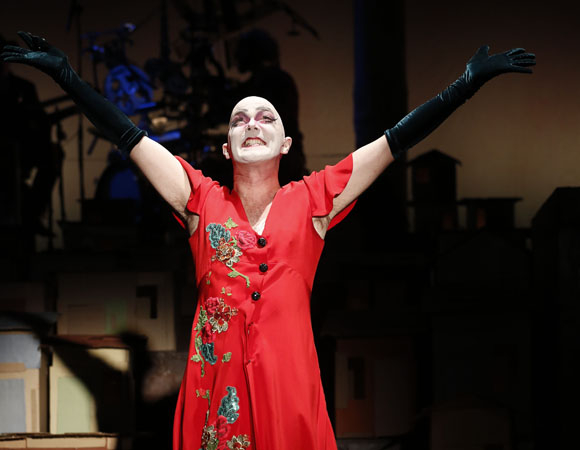Taylor Mac Rediscovers His Alter Ego at The Public Theater in Bertolt Brecht’s Good Person of Szechwan

(© Carol Rosegg)
“I’m so happy to be doing this remount,” said Taylor Mac, excitedly anticipating his second crack at Bertolt Brecht’s Good Person of Szechwan, now playing at The Public Theater. “I feel like this is what theater should be.”
Mac already garnered a substantial amount of praise from New York critics for his dual performance as the endlessly agreeable young prostitute Shen Te and her hardhearted male alter ego Shui Ta in the Foundry Theatre’s off-off-Broadway run at La MaMa last February. Mac returns to the production, ready to dig even deeper into Brecht’s text and the questions it poses about pursuing a “good” and affable life without being devoured by the thundering herd.
Mac offered TheaterMania some insight into his own internal Shen Te/Shui Ta balance, while sharing a few personal self-preservation strategies and officially declaring his retirement from the world of off-off-Broadway theater.
Do you see yourself as more of a Shen Te or a Shui Ta?
I’m definitely both. I think we all are. I’m pretty balanced within the two. I can be a jerk sometimes but I think my instinct is always to go to the nice place. That’s my Waspy upbringing. Sometimes my inner demon comes out…Unfortunately. [But] you get steamrolled over if you’re totally nice all the time.
After living with these two characters for so long, do the play’s questions about balancing your inner yin and yang spill over into your everyday conversations?
It becomes a constant conversation. I just made a dinner reservation the other night for my lover’s birthday, and they called back and said, “Oh, we made a mistake, we’re booked that night.” And I said, “Oh, okay. I’ll find another restaurant.” And they said, “Are you sure?” And I went, “Um, I don’t understand. Are you saying there’s room for me?” And they said, “Let me look again just to make sure.” And they said, “No, we’re really booked.” [When] I finally hung up, they called back and said they had a place. [I was] put in this position where I had to force myself into a reservation as opposed to accepting the way things are. You have to pull out your Shui Ta — your inner bad person — in order to get what you want in this world. Otherwise people can’t even give you the bare necessities — something as bourgeois as a dinner reservation.
Does the play make you wonder whether it’s even possible to find an appropriate balance if that’s the case?
The play specifically brings up questions of how. It’s there to inspire you to think about. How am I going to lead as good a life as I possibly can without being bulldozed over? And how can I give and give and give and still have enough of myself to be able to give?
As a performer, whose job is it to constantly give part of yourself away to an audience, and how do you preserve enough of yourself to keep giving?
The big thing is that nobody knows what’s true [and what’s] not. You can tell somebody it’s true on the stage — and it can be true — but the audience doesn’t necessarily know it’s true. There’s always that opportunity for you to be able to say no, that’s not true, because it’s theater. That’s how I protect myself. I can do whatever I want onstage because the conceit is that it could be a lie. Or [sometimes in rehearsal] I just have to say I’m going half. I like to give one hundred percent all the time, but there are times when you realize that if you do, you won’t be able to give one hundred percent for the show. Luckily, I’m working with people who understand that.
How does it feel to be revisiting the show after being able to step away from it for a while?
I love it. I think it’s the way we should be making theater. I wish that more people would do this. I’m done making off-off-Broadway theater. I can’t do it anymore. I can’t do that thing where you have one preview and then the critics come the next day and then you close it in three weeks and you barely scraped the surface. You spend all that time working on it and then it doesn’t get any life. I can’t do that model anymore. In my head, [it’s] the completely wrong way to go about doing things.
Is there a notable difference between this run and the last run?
I’m just trusting Brecht more this time around than I think I did before. It’s the same show — it’s like going out without perfume on or with perfume on. Nobody knows if you don’t wear it, but when you do sometimes there’s a special little extra scent.










